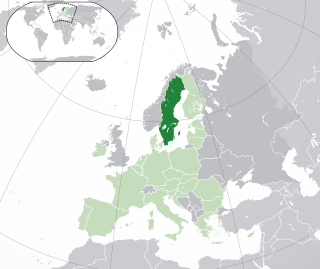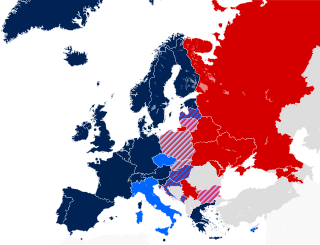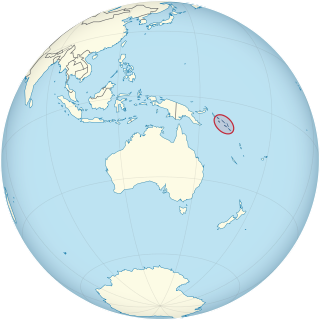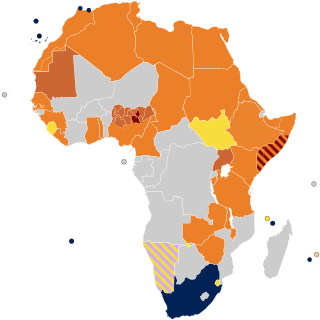| History of Sweden |
|---|
 |
| Timeline |
This article concerns LGBT history in the Nordic country of Sweden.
| History of Sweden |
|---|
 |
| Timeline |
This article concerns LGBT history in the Nordic country of Sweden.
Homosexuality in Sweden was decriminalised in 1944. [1] Same-sex marriage was legalized May 1st 2009, following the adoption of a gender-neutral marriage law by the Riksdag on April 1st of the same year. [2]
In 1950, the Swedish Federation for LGBT Rights (RFSL) was founded. [3]

Lesbian, gay, bisexual, and transgender (LGBT) movements are social movements that advocate for LGBT people in society. Although there is not a primary or an overarching central organization that represents all LGBT people and their interests, numerous LGBT rights organizations are active worldwide. The first organization to promote LGBT rights was the Scientific-Humanitarian Committee, founded in 1897 in Berlin.

Societal attitudes toward homosexuality vary greatly across different cultures and historical periods, as do attitudes toward sexual desire, activity and relationships in general. All cultures have their own values regarding appropriate and inappropriate sexuality; some sanction same-sex love and sexuality, while others may disapprove of such activities in part. As with heterosexual behaviour, different sets of prescriptions and proscriptions may be given to individuals according to their gender, age, social status or social class.

LGBT rights opposition is the opposition to legal rights, proposed or enacted, for lesbian, gay, bisexual, and transgender (LGBT) people. Laws that LGBT rights opponents may be opposed to include civil unions or partnerships, LGBT parenting and adoption, military service, access to assisted reproductive technology, and access to sex reassignment surgery and hormone replacement therapy for transgender individuals.
Homosexuality in India is legally permitted and tolerated by the most of the traditional native philosophies of the nation, and legal rights continue to be advanced in mainstream politics and regional politics. Homosexual cohabitation is also legally permitted and comes with some legal protections and rights.

Lesbian, gay, bisexual, and transgender (LGBT) people in South Africa have the same legal rights as non-LGBT people. South Africa has a complex and diverse history regarding the human rights of LGBT people. The legal and social status of between 400,000 to over 2 million lesbian, gay, bisexual, transgender and intersex South Africans has been influenced by a combination of traditional South African morals, colonialism, and the lingering effects of apartheid and the human rights movement that contributed to its abolition.

The Swedish Federation for Lesbian, Gay, Bisexual, Transgender and Queer Rights is a Swedish organization working for LGBT rights. Lawyer and social worker Trifa Shakely was elected as the new president in 2021.

The rights of lesbian, gay, bisexual, and transgender (LGBT) people in the United Kingdom of Great Britain and Northern Ireland have developed significantly over time. Today, lesbian, gay, and bisexual rights are considered to be advanced by international standards.

Lesbian, gay, bisexual, and transgender (LGBT) rights in Sweden are regarded as some of the most progressive in Europe and the world. Same-sex sexual activity was legalized in 1944 and the age of consent was equalized to that of heterosexual activity in 1972. Sweden also became the first country in the world to allow transgender people to change their legal gender post-sex reassignment surgery in 1972, whilst transvestism was declassified as an illness in 2009. Legislation allowing legal gender changes without hormone replacement therapy and sex reassignment surgery was passed in 2013.

Lesbian, gay, bisexual and transgender people (LGBT) in the Philippines face legal challenges not faced by non-LGBT people, with numerous anti-discrimination legislations, bills and laws that are struggling to be passed on a national level to protect LGBT rights nationwide, with some parts of the country only existing on a local government level. LGBT individuals in the Philippines are often faced with disadvantages and difficulties in acquiring equal rights within the country. They also have a higher rate of suicide and suicide ideation compared to their heterosexual counterparts.

Lesbian, gay, bisexual, and transgender (LGBT) rights are widely diverse in Europe per country. 22 of the 38 countries that have legalised same-sex marriage worldwide are situated in Europe. A further 11 European countries have legalised civil unions or other forms of more limited recognition for same-sex couples.

Lesbian, gay, bisexual, and transgender (LGBT) people in Solomon Islands face legal challenges not experienced by non-LGBT residents. Male same-sex sexual activity is illegal, punishable by up to 14 years imprisonment, but the law is not enforced.

Lesbian, gay, bisexual, and transgender (LGBT) people in Uganda face legal challenges not experienced by non-LGBT residents. Same-sex sexual activity is illegal for both men and women in Uganda. Originally criminalised by British colonial laws introduced when Uganda became a British protectorate, these laws have been retained since the country gained its independence.

Lesbian, gay, bisexual, and transgender (LGBT) rights in Africa are generally poor in comparison to the Americas, Western Europe and Oceania.

Lesbian, gay, bisexual, and transgender (LGBT) rights in Scotland are generally in line with the rest of the United Kingdom, which have evolved extensively over time and are now regarded as some of the most progressive in Europe. In both 2015 and 2016, Scotland was recognised as the "best country in Europe for LGBTI legal equality".

Lesbian, gay, bisexual, and transgender (LGBT) people in Mongolia face legal and social challenges not experienced by non-LGBT people, though there have been substantial improvements since the 1990s. Homosexuality was criminalised in Mongolia in 1961 through its Criminal Code. Following the Mongolian Revolution of 1990 and the peaceful transition to a democracy, homosexuality was legalised and awareness about LGBT people has become more prevalent. Hate crimes on the basis of sexual orientation and gender identity result in additional legal penalties. Hate speech based on these two categories has been outlawed in the country since 1 July 2017. Households headed by same-sex couples are, however, not eligible for the same legal protections available to opposite-sex couples.

Lesbian, gay, bisexual, and transgender (LGBT) people in Mozambique face legal challenges not faced by non-LGBT people. Same-sex sexual activity became legal in Mozambique under the new Criminal Code that took effect in June 2015. Discrimination based on sexual orientation in employment has been illegal since 2007.
Communist attitudes towards LGBT rights have evolved radically in the 21st century. In the 19th and 20th century, communist parties and Marxist–Leninist states varied on LGBT rights; some Western parties were among the first political parties to support LGBT rights, while others, especially the Soviet Union and its Eastern Bloc, harshly persecuted people of the LGBT community.
This article gives a broad overview of lesbian, gay, bisexual and transgender (LGBT) history in Canada. LGBT activity was considered a crime from the colonial period in Canada until 1969, when Bill C-150 was passed into law. However, there is still discrimination despite anti-discrimination law. For a more detailed listing of individual incidents in Canadian LGBT history, see also Timeline of LGBT history in Canada.
LGBT migration is the movement of lesbian, gay, bisexual and transgender (LGBT) people around the world or within one country. LGBT individuals choose to migrate so as to escape discrimination, bad treatment and negative attitudes due to their sexuality, including homophobia and transphobia. These people are inclined to be marginalized and face socio-economic challenges in their home countries. Globally and domestically, many LGBT people attempt to leave discriminatory regions in search of more tolerant ones.
The following is a timeline of lesbian, gay, bisexual, and transgender (LGBT) history in the 20th century.